高中英语必修三unit 1 Festivals around the world Warming up课件(37张)
文档属性
| 名称 | 高中英语必修三unit 1 Festivals around the world Warming up课件(37张) |
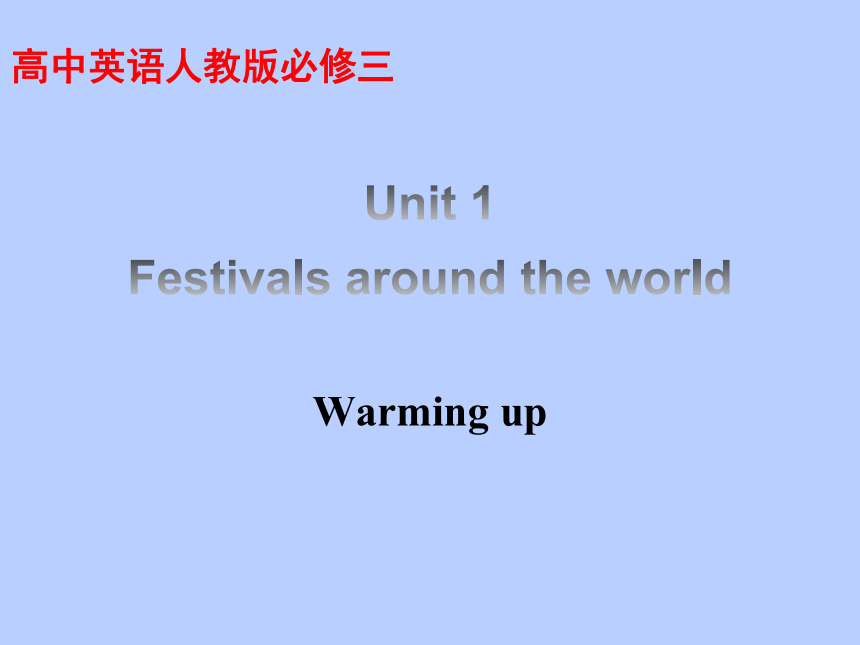
|
|
| 格式 | zip | ||
| 文件大小 | 7.4MB | ||
| 资源类型 | 教案 | ||
| 版本资源 | 人教版(新课程标准) | ||
| 科目 | 英语 | ||
| 更新时间 | 2019-02-24 00:00:00 | ||
图片预览

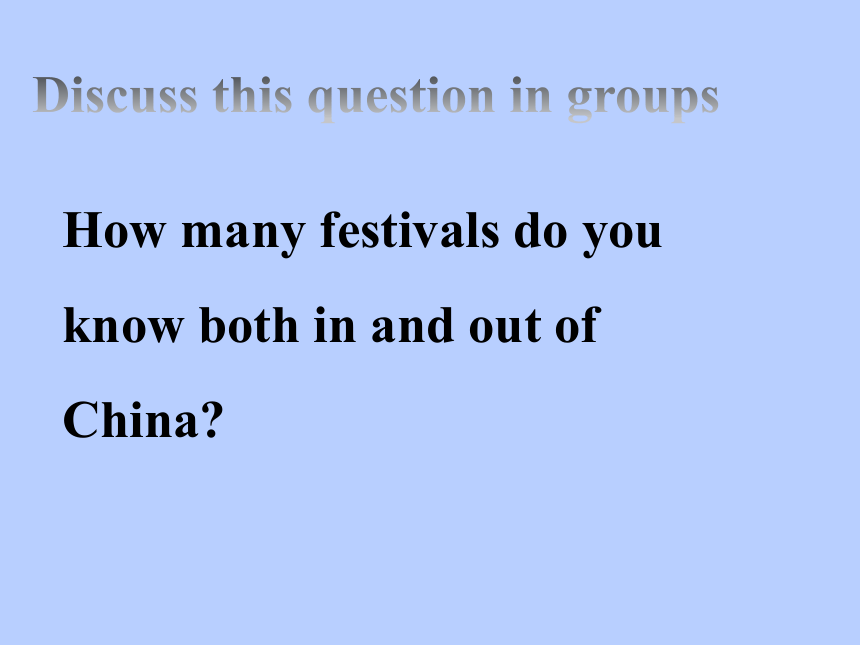
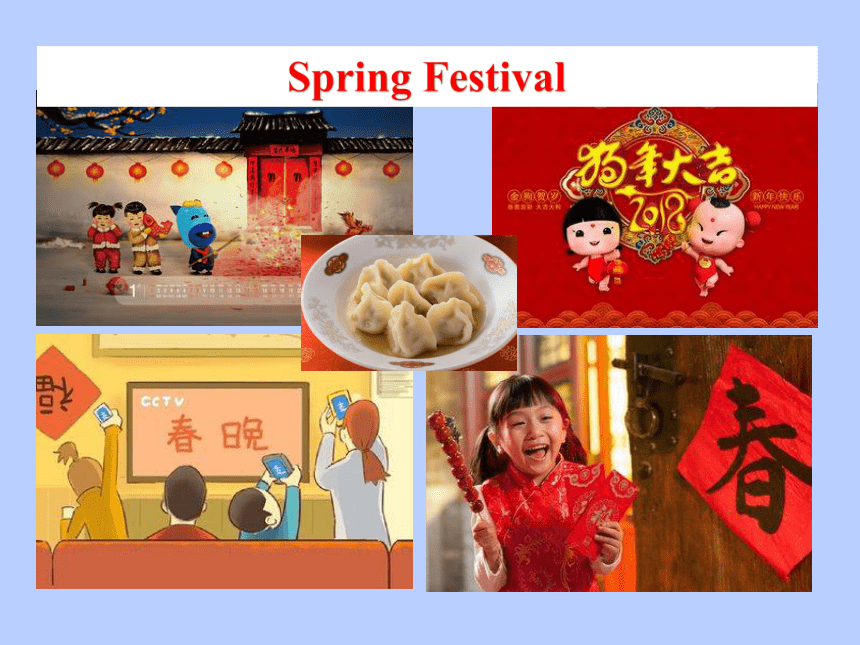
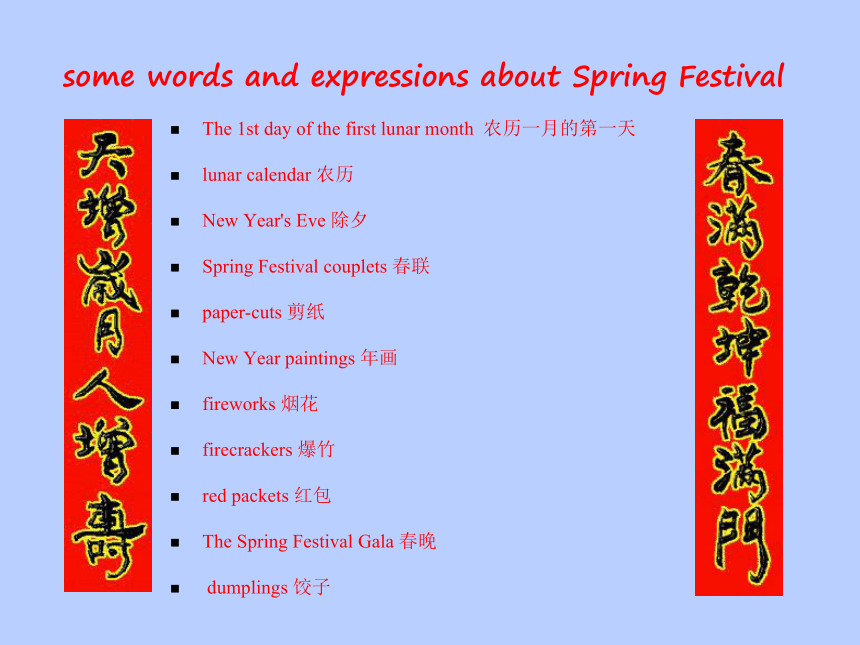
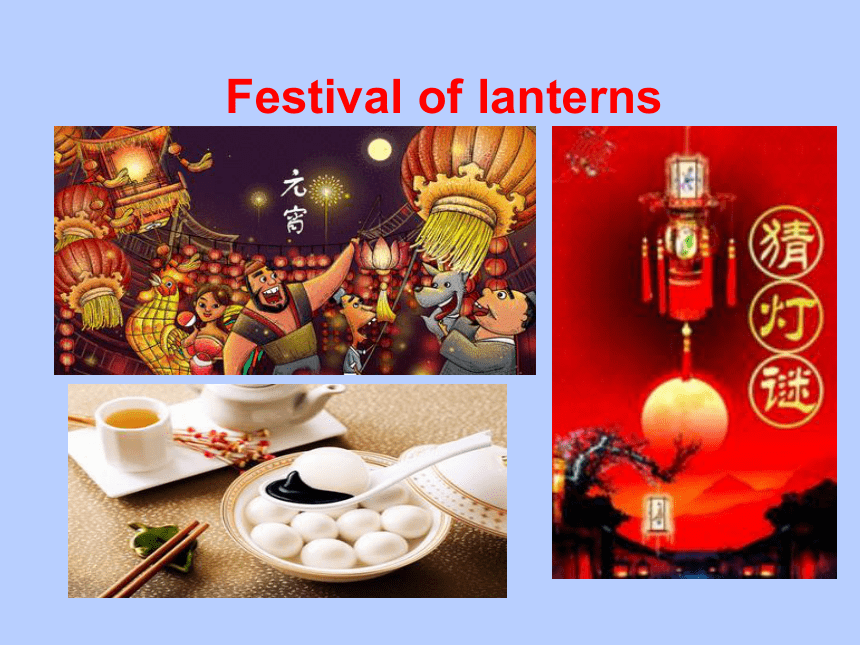

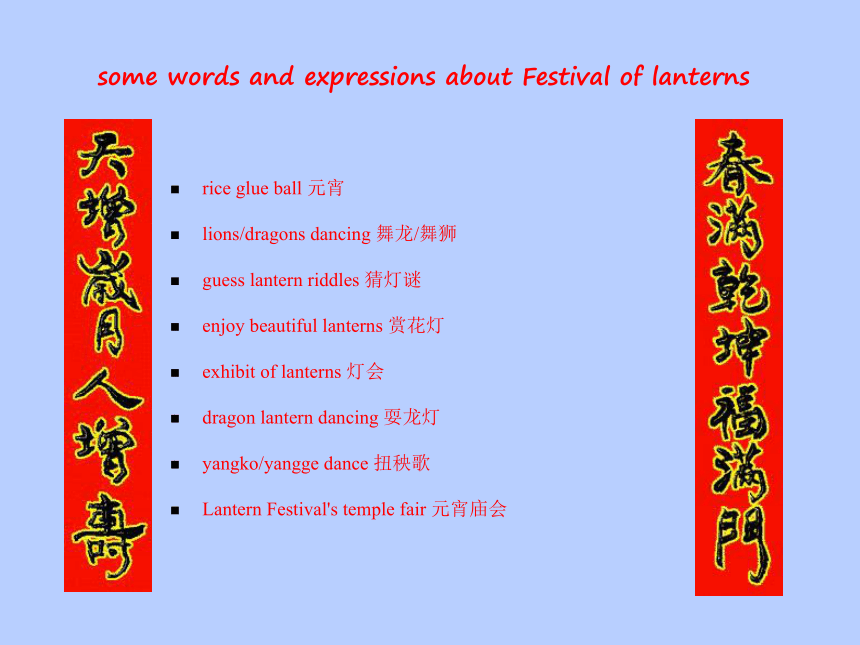

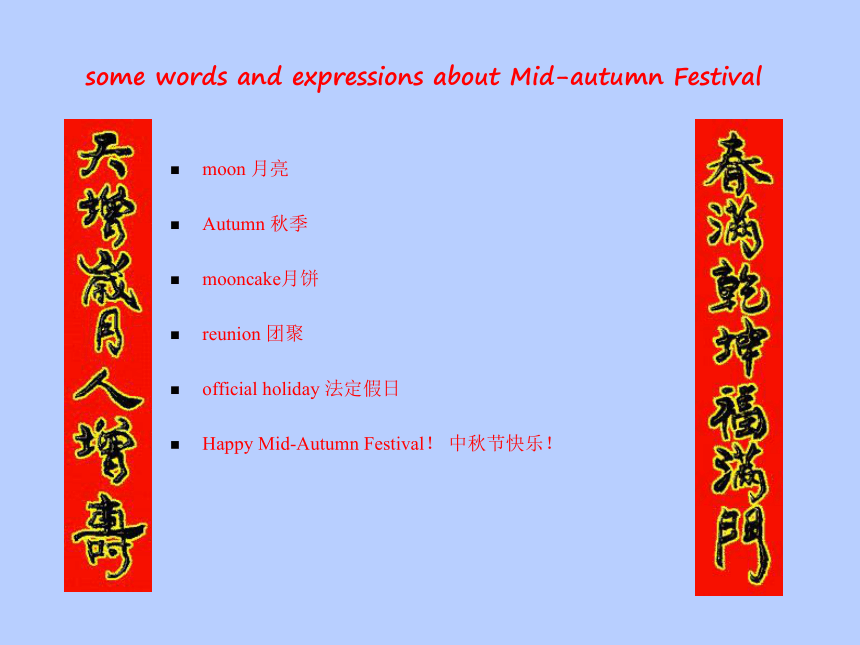

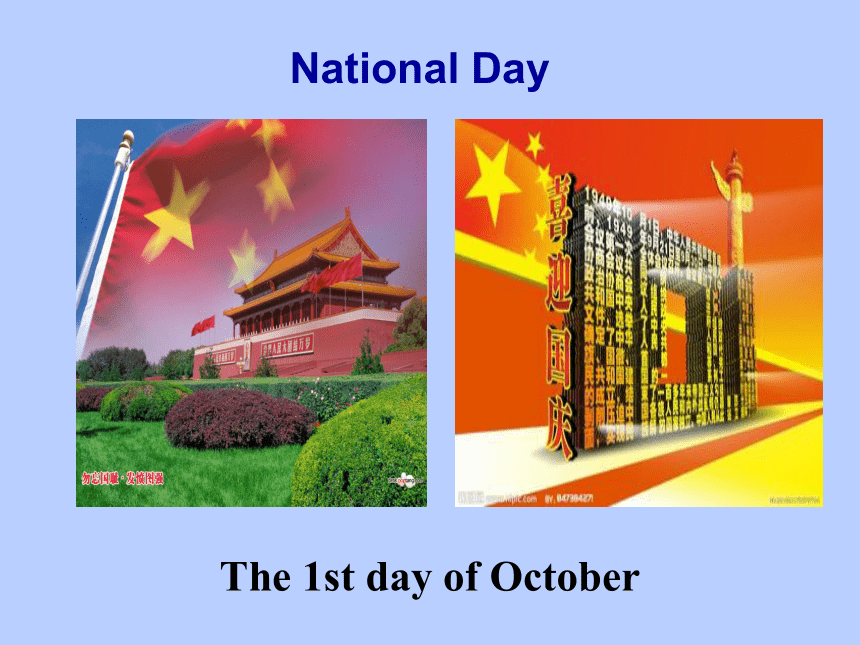
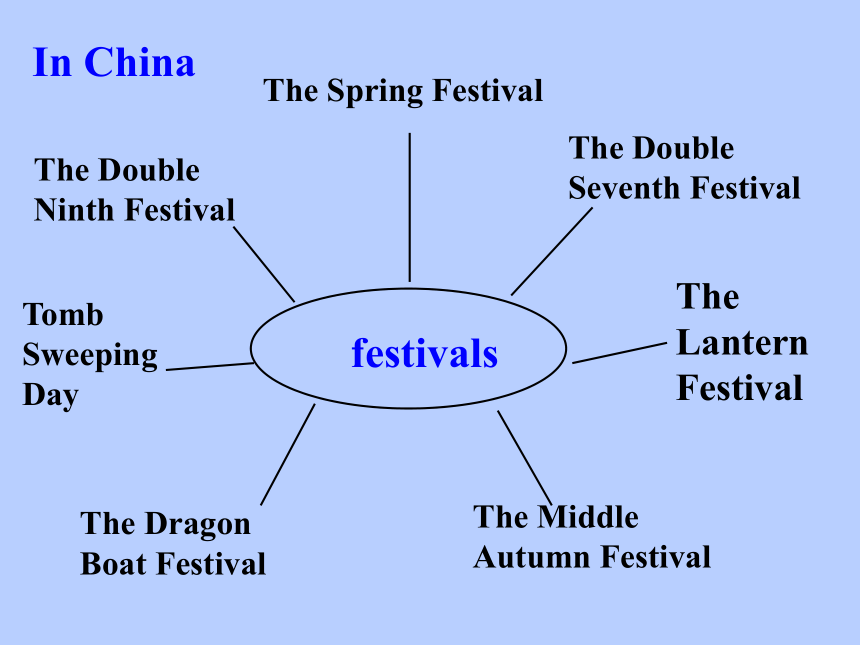
文档简介
高中英语人教版必修三
How many festivals do you
know both in and out of
China?
Spring Festival
some words and expressions about Spring Festival
The 1st day of the first lunar month 农历一月的第一天
lunar calendar 农历
New Year's Eve 除夕
Spring Festival couplets 春联
paper-cuts 剪纸
New Year paintings 年画
fireworks 烟花
firecrackers 爆竹
red packets 红包
The Spring Festival Gala 春晚
dumplings 饺子
Festival of lanterns
yuanxiao
some words and expressions about Festival of lanterns
rice glue ball 元宵
lions/dragons dancing 舞龙/舞狮
guess lantern riddles 猜灯谜
enjoy beautiful lanterns 赏花灯
exhibit of lanterns 灯会
dragon lantern dancing 耍龙灯
yangko/yangge dance 扭秧歌
Lantern Festival's temple fair 元宵庙会
Mid-Autumn Festival
some words and expressions about Mid-autumn Festival
moon 月亮
Autumn 秋季
mooncake月饼
reunion 团聚
official holiday 法定假日
Happy Mid-Autumn Festival! 中秋节快乐!
Army Day-August 1st
The 1st day of October
National Day
The Dragon Boat Festival
The Double Ninth Festival
The Spring Festival
Tomb Sweeping Day
The Lantern Festival
The Middle
Autumn Festival
The Double
Seventh Festival
In China
festivals
Valentine's Day
In February
Carnival (狂欢节)
Easter 复活节
The first Sunday after a full moon on
or after March 21
Fool's?Day
the first day in April
Thanksgiving Day
The fourth Thursday in November
November 31st
Halloween 万圣节
festivals
Christmas
Fool's?Day
Valentine's?Day
Carnival
Easter
Thanksgiving Day
Halloween
In foreign countries
Women's Day-March 8
The 1st day of May
Labour Day
Mother's Day
The second Sunday in May
The 1st day of June
Children's Day
The 10th day of September
Teachers' Day
Festivals are meant to celebrate important times of year. Different countries have different festivals. Work in groups and list below three more Chinese festivals that you know. Discuss when they take place, what they celebrate and what people do at that time. Then tell the group which festival is your favourite and Why.
Festival Time of
year/
date What it celebrates What people do
Mid-Autumn
Festival
autumn
/fall
the beauty of the full moon,harvest, time with family
and friends give and eat mooncakes, watch the full moon with family and friends
Spring
Festival
January/
February
the end of winter,arrival of spring, Lunar New Year, reunion with family and relatives
give money in red paper to children; see dragon dances; eat fish, prawns and dumplings;visit family members
Festival Time of
year/date What it celebrates What people do
National
Day
October 1
the founding of the People's Republic of China in 1949
take time off work; travel to visit family or to see other parts of China; go shopping
Festival Time of
year/date What it celebrates What people do
Dragon
Boat
Festival/Duanwu Festival
the fifth day of the fifth month in lunar calendar
the memory of the beloved poet Qu Yuan who died in 278 BC
eat zongzi;
watch dragon boat races; throw rice wrapped in reed leaves into water in memory of Qu Yuan; put herbs on doorways for good health
Festival Time of
year/date What it celebrates What people do
Festival are meant to celebrate important times of year.
人们通过节日来庆祝重要的事情。
此句如果改成主动语态,就很容易翻译了:
People mean festivals to celebrate important events.
(1) mean sb. or sth. to do sth.=intend sb. or sth. to do sth意欲、打算让
某人做某事
e.g. I never mean her to read those comments.
我没打算让她读那些评论。
(2) mean doing sth 意思是做某事,意味着做某事
eg.In some parts of London, missing a bus means waiting for another hour.
在伦敦的一些地方, 错过一班公共汽车意味着再等一个小时。
(3) mean to do sth sth=intent to do sth有意做某事
eg. I didn’t mean to hurt you.
我并不是有意伤害你的。
(4) mean adj小气的,吝啬的
eg. He is such a mean person.
他是如此一个吝啬的人。
3. Discuss when they take place, what they celebrate and
what people do at that time.
讨论它们(中国节日)什么时间进行, 庆祝的是什么事件, 和
人们在那天所做的事。
(1) take place 发生;举行
eg:In the meantime, an economic crisis took place.
同时,一场经济危机发生了。
eg:The Olympic Games take place every four years.
奥林匹克运动会每四年举行一次。
(2) 与place相关短语:
take one’s place = take the place of ... 代替…
take the first place 获得第一名
in the first place 首先, 第一点
in the last place 最后
in one's place 处于某人的位置,
为某人设身处地想一想
in place 放在原来的位置, 就位
in place of 代替, 用……而不用……
(3) 易混辨析
take place / happen / break out / occur
take place 通常表示计划、安排之内的“发生”。
happen 指事情偶然的发生,常带有未能预见
的含义;另外,还有“碰巧”之意。
break out 指火灾、战争或瘟疫的突然爆发。
occur 指按计划发生,常指(某想法、某事)出现在某人的头脑中。常见结构:It occurs/occurred to sb. that表示“某人想起某事”。It occurred to me that I had forgotten my keys.
How many festivals do you
know both in and out of
China?
Spring Festival
some words and expressions about Spring Festival
The 1st day of the first lunar month 农历一月的第一天
lunar calendar 农历
New Year's Eve 除夕
Spring Festival couplets 春联
paper-cuts 剪纸
New Year paintings 年画
fireworks 烟花
firecrackers 爆竹
red packets 红包
The Spring Festival Gala 春晚
dumplings 饺子
Festival of lanterns
yuanxiao
some words and expressions about Festival of lanterns
rice glue ball 元宵
lions/dragons dancing 舞龙/舞狮
guess lantern riddles 猜灯谜
enjoy beautiful lanterns 赏花灯
exhibit of lanterns 灯会
dragon lantern dancing 耍龙灯
yangko/yangge dance 扭秧歌
Lantern Festival's temple fair 元宵庙会
Mid-Autumn Festival
some words and expressions about Mid-autumn Festival
moon 月亮
Autumn 秋季
mooncake月饼
reunion 团聚
official holiday 法定假日
Happy Mid-Autumn Festival! 中秋节快乐!
Army Day-August 1st
The 1st day of October
National Day
The Dragon Boat Festival
The Double Ninth Festival
The Spring Festival
Tomb Sweeping Day
The Lantern Festival
The Middle
Autumn Festival
The Double
Seventh Festival
In China
festivals
Valentine's Day
In February
Carnival (狂欢节)
Easter 复活节
The first Sunday after a full moon on
or after March 21
Fool's?Day
the first day in April
Thanksgiving Day
The fourth Thursday in November
November 31st
Halloween 万圣节
festivals
Christmas
Fool's?Day
Valentine's?Day
Carnival
Easter
Thanksgiving Day
Halloween
In foreign countries
Women's Day-March 8
The 1st day of May
Labour Day
Mother's Day
The second Sunday in May
The 1st day of June
Children's Day
The 10th day of September
Teachers' Day
Festivals are meant to celebrate important times of year. Different countries have different festivals. Work in groups and list below three more Chinese festivals that you know. Discuss when they take place, what they celebrate and what people do at that time. Then tell the group which festival is your favourite and Why.
Festival Time of
year/
date What it celebrates What people do
Mid-Autumn
Festival
autumn
/fall
the beauty of the full moon,harvest, time with family
and friends give and eat mooncakes, watch the full moon with family and friends
Spring
Festival
January/
February
the end of winter,arrival of spring, Lunar New Year, reunion with family and relatives
give money in red paper to children; see dragon dances; eat fish, prawns and dumplings;visit family members
Festival Time of
year/date What it celebrates What people do
National
Day
October 1
the founding of the People's Republic of China in 1949
take time off work; travel to visit family or to see other parts of China; go shopping
Festival Time of
year/date What it celebrates What people do
Dragon
Boat
Festival/Duanwu Festival
the fifth day of the fifth month in lunar calendar
the memory of the beloved poet Qu Yuan who died in 278 BC
eat zongzi;
watch dragon boat races; throw rice wrapped in reed leaves into water in memory of Qu Yuan; put herbs on doorways for good health
Festival Time of
year/date What it celebrates What people do
Festival are meant to celebrate important times of year.
人们通过节日来庆祝重要的事情。
此句如果改成主动语态,就很容易翻译了:
People mean festivals to celebrate important events.
(1) mean sb. or sth. to do sth.=intend sb. or sth. to do sth意欲、打算让
某人做某事
e.g. I never mean her to read those comments.
我没打算让她读那些评论。
(2) mean doing sth 意思是做某事,意味着做某事
eg.In some parts of London, missing a bus means waiting for another hour.
在伦敦的一些地方, 错过一班公共汽车意味着再等一个小时。
(3) mean to do sth sth=intent to do sth有意做某事
eg. I didn’t mean to hurt you.
我并不是有意伤害你的。
(4) mean adj小气的,吝啬的
eg. He is such a mean person.
他是如此一个吝啬的人。
3. Discuss when they take place, what they celebrate and
what people do at that time.
讨论它们(中国节日)什么时间进行, 庆祝的是什么事件, 和
人们在那天所做的事。
(1) take place 发生;举行
eg:In the meantime, an economic crisis took place.
同时,一场经济危机发生了。
eg:The Olympic Games take place every four years.
奥林匹克运动会每四年举行一次。
(2) 与place相关短语:
take one’s place = take the place of ... 代替…
take the first place 获得第一名
in the first place 首先, 第一点
in the last place 最后
in one's place 处于某人的位置,
为某人设身处地想一想
in place 放在原来的位置, 就位
in place of 代替, 用……而不用……
(3) 易混辨析
take place / happen / break out / occur
take place 通常表示计划、安排之内的“发生”。
happen 指事情偶然的发生,常带有未能预见
的含义;另外,还有“碰巧”之意。
break out 指火灾、战争或瘟疫的突然爆发。
occur 指按计划发生,常指(某想法、某事)出现在某人的头脑中。常见结构:It occurs/occurred to sb. that表示“某人想起某事”。It occurred to me that I had forgotten my keys.
同课章节目录
